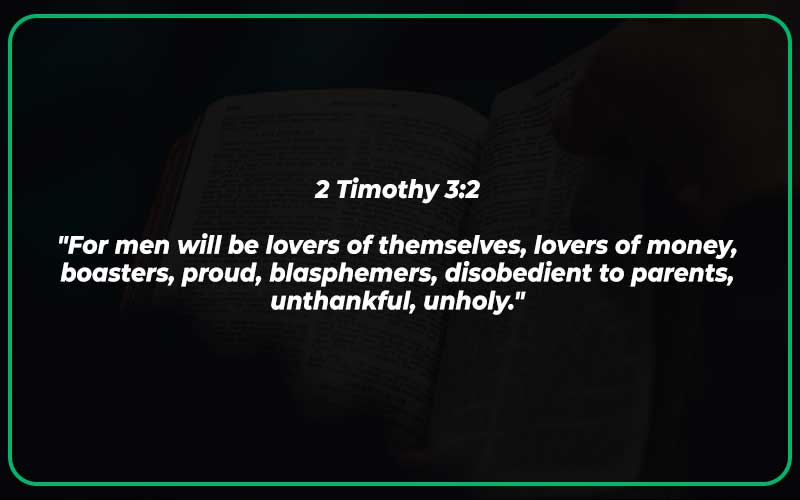Gratitude is a virtue that brings joy and transforms our perspective. Conversely, ungratefulness can hinder our ability to appreciate the blessings in our lives. The Bible addresses the importance of gratitude and warns against the dangers of ungratefulness.
Let’s explore these verses together, discovering the transformative power of gratitude and learning to cultivate a thankful heart in all circumstances.
Bible Verses about Ungratefulness
Psalm 106:7
“Our fathers, when they were in Egypt, did not consider Your wondrous works; they did not remember the multitude of Your mercies.”
The psalmist reflects on the ungratefulness of the Israelites during their time in Egypt. Despite witnessing God’s miraculous works and experiencing His abundant mercies, they failed to acknowledge and appreciate His goodness.
Luke 17:17-18
“Then Jesus answered and said, ‘Were there not ten cleansed? But where are the nine? Were there not any found who returned to give glory to God except this foreigner?'”
Jesus encounters ten lepers whom He heals, but only one returns to express gratitude. This passage highlights the significance of gratitude and the importance of acknowledging God’s blessings.
Romans 1:21
“Because, although they knew God, they did not glorify Him as God, nor were thankful, but became futile in their thoughts, and their foolish hearts were darkened.”
Paul describes how ungratefulness can lead to a downward spiral, as people who neglect to acknowledge and honor God become consumed by futile thoughts and spiritual darkness.
1 Thessalonians 5:18
“In everything give thanks; for this is the will of God in Christ Jesus for you.”
This verse emphasizes the command to give thanks in all circumstances. It reminds believers that gratitude is an integral part of God’s will for their lives.
Hebrews 12:28
“Therefore, since we are receiving a kingdom which cannot be shaken, let us have grace, by which we may serve God acceptably with reverence and godly fear.”
Gratitude should motivate believers to serve God acceptably. Recognizing the unshakable kingdom they have received through Christ, they should respond with reverence, godly fear, and grateful hearts.
Ephesians 5:20
“Giving thanks always for all things to God the Father in the name of our Lord Jesus Christ.”
Believers are encouraged to maintain a continuous attitude of thankfulness, expressing gratitude to God the Father for all things, regardless of the circumstances.
2 Timothy 3:2
“For men will be lovers of themselves, lovers of money, boasters, proud, blasphemers, disobedient to parents, unthankful, unholy.”
Paul warns Timothy of the characteristics displayed by people in the last days, including ungratefulness. It serves as a reminder to guard against such attitudes and foster a spirit of gratitude.

Colossians 3:15
“And let the peace of God rule in your hearts, to which also you were called in one body; and be thankful.”
A heart ruled by the peace of God is marked by thankfulness. Believers are encouraged to cultivate gratitude as they live in unity with fellow believers.
Psalm 95:2
“Let us come before His presence with thanksgiving; let us shout joyfully to Him with psalms.”
This verse invites worshippers to approach God’s presence with thanksgiving and exuberant praise. Gratitude is an essential aspect of engaging in heartfelt worship.
1 Chronicles 16:34
“Oh, give thanks to the LORD, for He is good! For His mercy endures forever.”
David’s psalm acknowledges God’s goodness and everlasting mercy, prompting readers to respond with thanksgiving for His unchanging faithfulness.
Philippians 4:6
“Be anxious for nothing, but in everything by prayer and supplication, with thanksgiving, let your requests be made known to God.”
In the face of anxiety, believers are encouraged to approach God in prayer, presenting their requests with a heart of gratitude. Trusting in His provision, they can find peace.
Psalm 28:7
“The LORD is my strength and my shield; my heart trusted in Him, and I am helped; therefore my heart greatly rejoices, and with my song I will praise Him.”
The psalmist exclaims his trust in God and the resulting joy in his heart. Gratitude overflows in praise and worship as he recognizes God’s protection and help.
Jonah 2:9
“But I will sacrifice to You with the voice of thanksgiving; I will pay what I have vowed. Salvation is of the LORD.”
Jonah, having experienced God’s salvation from the belly of the fish, commits to offer sacrifices and expressions of thanksgiving. His gratitude is a response to God’s deliverance.
1 Corinthians 15:57
“But thanks be to God, who gives us the victory through our Lord Jesus Christ.”
Paul highlights God’s ultimate victory through Jesus Christ and expresses gratitude for this triumph. Believers can share in this victory and respond with thankful hearts.
Psalm 9:1
“I will praise You, O LORD, with my whole heart; I will tell of all Your marvelous works.”
The psalmist declares his intention to praise the Lord wholeheartedly and testify to His wondrous deeds. Gratitude fuels his worship and witness.
2 Corinthians 2:14
“Now thanks be to God who always leads us in triumph in Christ and through us diffuses the fragrance of His knowledge in every place.”
Paul recognizes God’s constant leading and victorious presence in the lives of believers. As a result, gratitude emanates from their lives, spreading the fragrance of Christ’s knowledge to others.
Psalm 50:14
“Offer to God thanksgiving, and pay your vows to the Most High.”
This verse exhorts believers to offer thanksgiving as an offering to God, fulfilling their commitments and pledges to the Most High. Gratitude is an essential aspect of our worship and devotion.
Luke 10:20
“Nevertheless do not rejoice in this, that the spirits are subject to you, but rather rejoice because your names are written in heaven.”
Jesus reminds His disciples to find their ultimate joy and gratitude in the fact that their names are written in heaven. It redirects their focus from mere accomplishments to the eternal blessings of salvation.
Also Read: 27 Bible Verses about Making Fun of People (With Commentary)
Psalm 107:1
“Oh, give thanks to the LORD, for He is good! For His mercy endures forever.”
This verse echoes a recurring theme in the Psalms, emphasizing the goodness and enduring mercy of the Lord. Gratitude flows as a response to His character and benevolence.
1 Timothy 4:4-5
“For every creature of God is good, and nothing is to be refused if it is received with thanksgiving; for it is sanctified by the word of God and prayer.”
Paul teaches Timothy about the sanctity of God’s creation and the importance of receiving it with thanksgiving. Gratitude and prayer sanctify the blessings God provides.
Psalm 116:17
“I will offer to You the sacrifice of thanksgiving and will call upon the name of the LORD.”
The psalmist expresses his commitment to present the sacrifice of thanksgiving to God while calling upon His name. Gratitude and worship go hand in hand.
1 Chronicles 29:13
“Now, therefore, our God, we thank You and praise Your glorious name.”
In this prayer of David, he leads the people in expressing thankfulness and praise to God. Gratitude is intertwined with acknowledging God’s glory.
Psalm 107:8
“Oh, that men would give thanks to the LORD for His goodness, and for His wonderful works to the children of men!”
The psalmist passionately appeals to people to give thanks to the Lord for His goodness and wonderful works. Gratitude is an appropriate response to His abundant blessings.
Colossians 2:6-7
“As you have therefore received Christ Jesus the Lord, so walk in Him, rooted and built up in Him and established in the faith, as you have been taught, abounding in it with thanksgiving.”
Paul encourages believers to continue in their walk with Christ, being rooted in Him and overflowing with gratitude. Thankfulness is a natural expression of a growing faith.
Psalm 136:1
“Oh, give thanks to the LORD, for He is good! For His mercy endures forever.”
The psalmist invites readers to join in giving thanks to the Lord for His goodness and enduring mercy. God’s character prompts gratefulness that endures through all seasons of life.
1 Corinthians 1:4
“I thank my God always concerning you for the grace of God which was given to you by Christ Jesus.”
Paul expresses gratitude to God for the grace bestowed upon the Corinthians through Jesus Christ. Gratitude for God’s grace toward others can foster unity and encouragement.
Psalm 118:1
“Oh, give thanks to the LORD, for He is good! For His mercy endures forever.”
Once again, this psalm verse echoes the refrain of gratitude for the Lord’s goodness and everlasting mercy. Gratitude is an ongoing response to God’s unwavering love.

What Does the Bible Say About Ungratefulness?
The Bible addresses the issue of ungratefulness, emphasizing the importance of gratitude and thankfulness. Throughout its texts, ungratefulness is depicted as a negative trait that goes against God’s will and leads to various consequences.
In the Old Testament, ungratefulness is often associated with the people of Israel’s disobedience and lack of faith towards God despite His continuous provision, protection, and miracles in their lives. Several stories highlight the consequences of ungratefulness, such as the Israelites’ complaints in the wilderness after being delivered from Egypt (Exodus 16:2-3), the grumbling during their journey (Numbers 14:26-35), and their forgetfulness of God’s goodness (Psalm 78:10-11).
In the New Testament, ungratefulness is discouraged, and thankfulness is encouraged as an essential attitude in a believer’s life. In the letters written by the apostle Paul, he frequently reminds Christians to give thanks in all circumstances (1 Thessalonians 5:18) and to cultivate a spirit of gratitude (Colossians 3:15-17). The apostle also warns against ungratefulness, which he describes as one of the characteristics of ungodly and unrighteous people (Romans 1:21).
Jesus himself set an example of thankfulness during his earthly ministry. He often gave thanks to God, especially before performing miracles and during the Last Supper (Matthew 14:19, John 6:11, Luke 22:19).
In summary, the Bible consistently portrays ungratefulness as a negative and ungodly attitude. Gratitude, on the other hand, is seen as a virtue that pleases God and leads to a more positive and content life. The Scriptures encourage believers to be thankful in all circumstances and to acknowledge God’s goodness and blessings in their lives.

